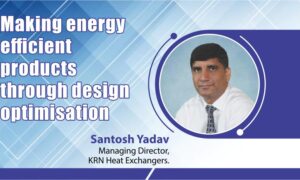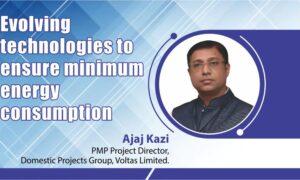Working right from the ground level, while trying to understand the customer’s expectation and their needs, have been a key for us to remain persistently competitive in the market.
Cornad Latham, Atlas Copco India, General Manager – Compressor Techniques
Accentuating on manufacturing in India, Cornad Latham, General Manager – Compressor, Atlas Copco India in a conversation with Megha Iyer, discusses on how Atlas Copco is finding a balanced work in the price sensitive Indian market, and delivering best of their products services, without upsetting the pricing and manufacturing sentiments.
How do you view the industrial compressors’ market of India?
The industry is completely driven right now, predominantly, by the manufacturers. As the industrial manufacturing is growing, the compressor market is also expected to grow simultaneously. However, if we go by the statistics, provided by the government and the agencies, the manufacturing industry has also been contributing to the GDP of India, and I think that the growth is quite consistent, as the government was expecting to drive a minimum of 25 per cent of the total GDP from the manufacturing sector. So, for us, it’s a good opportunity to grow, along with the manufacturing industry.
You come up with varied compressor technologies and products almost yearly. How do you cater to the cost sensitive Indian Market?
We started manufacturing in India in 1960, and that itself is one of the advantages for us in the Indian market. In 2013, we launched our Chakanplant, in Pune, which was aimed at increasing our footprint into the manufacturing industry in India, as we knew that India would be a growing market, in terms of manufacturing. Working right from the ground level, while trying to understand the customer’s expectation and their needs, along with working in line with the local suppliers, have been a key for us to remain persistently competitive in the market. Predominantly, I think, the concept of Make in India, led the local manufacturing grow more, moreover, the longevity and the history that we have had in India, we are not very much into importing our products to India, and we in fact, prefer to have everything to be made in India. The products launched today, are actually Indian made and interestingly, one of our product’s development was completely carried out in India. We took the design, enhanced it, and the end result product was then exported to various countries. We know the mind and expectation of the Indian audience and the Indian customers.
What are the major hurdles that you face while manufacturing in India?
We have always believed in Making in India, and ever since we established our manufacturing and production facility in India in 1960, and in 2013 we have been producing our products in India, and that will always be that way. In fact, we have been firm on making products in India right from 1960 and today, if we look back, we find that we have been doing well, and our customers’ base is widening year after year, and now, we need to make more investments. Apart from the 5 new products, we are planning to have more products to be launched soon in India. So, precisely, I don’t see any major hurdles, in fact, we have been consistently focusing on having a right supply chain, in order to cater better and enhanced services, by having right and the best suppliers, because, only then we can ensure the quality product, and to proof them, we have a quality control department who does ensure them to be the best, and make sure of complying to their auditing processes, and ensure that the cost is controlled. All we need to take care of, is, having balance between the cost and the deliverables, and Atlas Copco, imperatively produces best quality products, and place them into the price competitive market in India. There are companies and customers, which are highly focused on the pricing terms, and it’s our responsibility to comprehend with it. Moreover, we have noticed that, in India, people are still analysing us against competition and they are interested to seek more clean air by using less power, and that’s what even we are looking to serve. There are different levels of expectation, like some customers are more inclined towards the price factor, along with reliability, durability, at the other hand, we have premium customers who are more interested in having specific services, like infusing minimum energy and generating maximum amount of air of it and is interested in investing a big amount at initial stage. Then comes the total life cost.
What kind of R&D and how much investments are being done for the same?
We have a strategies for the research and development process, having multiple level of tests, with machines that are designed to be cost competitive, we have machines that are designed especially for the professional segment, and few are specifically made for the premiere segment and premiere customers.
How is Atlas Copco contributing towards balancing the ecosystem and minimising the CO2 emissions?
If you want to infuse less energy to produce compressor, you require less power, and if you need less power you will make least use of coal, and since India is more focused on generating less power from coal, and when the coal consumption is reduced, lesser will be the pollution. Roughly, 10 per cent of total manufacturing energy is being utilised by the compressors, and we are aiming at reducing the energy consumption, and we are ensuring that every machine we built, is energy efficient. Our latest machines and compressors, will be almost 4 per cent to 8 per cent more efficient than our previous machines.
What are the key factors that makes you stand out from your competitors?
We believe that we are one of the market leaders. There’s no independent body appointed to analyse the strengths in our industry, unlike the countries like, China, UK, USA, where the independent agencies have major market, which allows the industry to analyse their market position, and their potential captivity. We have also being catering to the automotive segment among the other areas of expertise, and for compressors, the industry haven’t been yet analysed or compared to any, so, considering our numbers and our client profile and our varied services, we believe that we are one of the market leaders.
How are you implementing ‘Net Zero’ concept?
Very recently, we have installed solar panels and rooftop solars to our Chakan plant in Pune, which produces almost 85 per cent of our total energy consumption. During any normal the day-today manufacturing, around 85 per cent of the total energy that’s being utilised for testing machines and other testing procedures, are generated through the solar panels. And, during the weekends’, we distribute the energy produced, to the local surrounding and to the nearby industries and other deliverables. The best thing we can do to reduce the energy consumption of our compressors, further letting reducing the energy consumption of our customers. We also have energy recovery solutions, so whatever energy is being produced and utilised by the compressors, is converted into the heat energy, in order to reuse the produced energy into varied applications and plants that may include provisioning water for the boilers and for the culinary activities in the pantry.
How do you view India’s Budget 2019?
I think the union budget was good enough; however, the one particular thing is that we are satisfied about the fact that previous government has again come up which is really good for the business also. Moreover, I feel, when there’s a stable government, it’s easier for them and for the industry, to liaise with new business opportunities, while enduring the existing ones. Moreover, one thing we found interesting in the union budget is the electric mobility, and government’s emphasis on sustainability. If we look into the electric mobility vehicles, particularly, our focus will entirely be on the suppliers and the manufacturers of electric vehicles. We are already one of the suppliers to the automotive industry, and are associated with brands like, Tata, Suzuki, Volkswagon, among the others. So, since the government is converging on the electric mobility, the existing suppliers will continue to cater to the industry, and may bring in new suppliers, for the lithium batteries, among the new and trending required products, which is a good move, as it ties in very much with our focus on sustainability, and we, as an organisation, are constantly making efforts to reduce the energy consumption’s bill for our customers, the combination helps us work in ease.
Cookie Consent
We use cookies to personalize your experience. By continuing to visit this website you agree to our Terms & Conditions, Privacy Policy and Cookie Policy.














